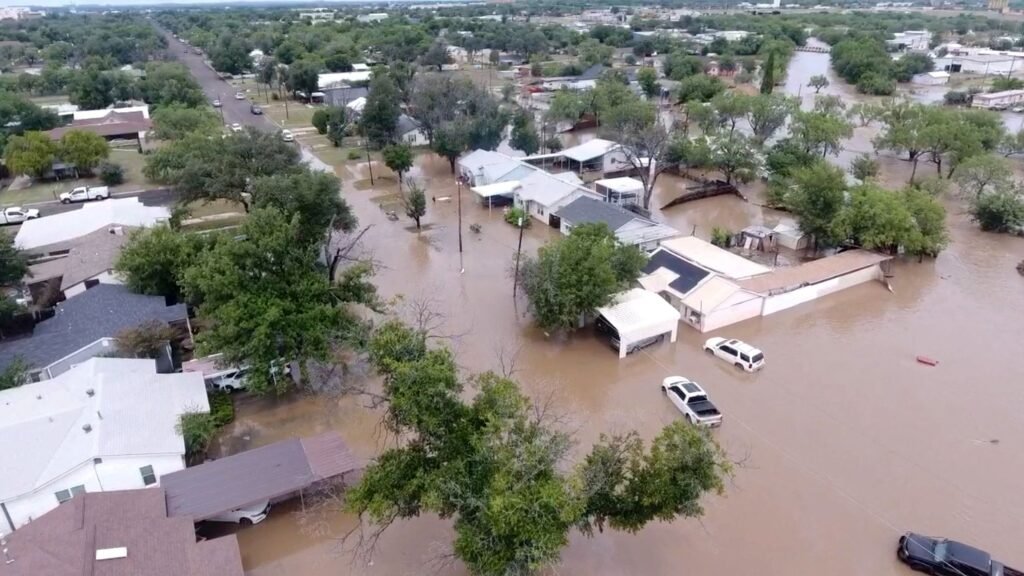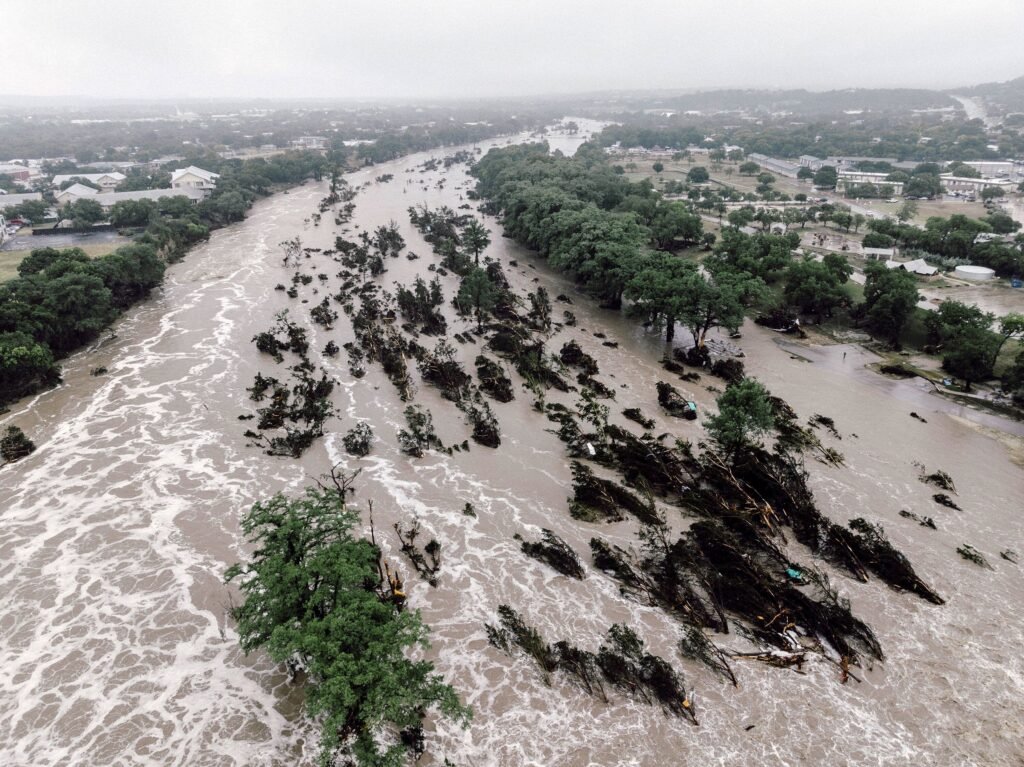Texas has recently faced deadly flooding that left communities devastated and lives lost. Amid recovery efforts, Senator Ted Cruz is speaking out—not just about the damage—but about the blame game that followed.
A Tragedy That Hit Home
Severe storms swept across Texas last week, triggering catastrophic flooding that took several lives and displaced hundreds. The hardest-hit areas included Harris County, Montgomery County, and portions of East Texas, where floodwaters surged through homes, roads, and businesses. Emergency responders worked around the clock, and volunteers poured in to help their neighbors.
While families grieve and communities begin to rebuild, national headlines quickly shifted—not to relief efforts—but to political finger-pointing. Leaders from opposing parties began blaming each other for poor infrastructure, late warnings, and climate inaction.
That’s when Ted Cruz on Texas flooding became the center of attention.
Cruz Calls for Unity, Not Blame
In a strongly worded press conference held in Houston, Senator Ted Cruz condemned the political blame game that erupted in the wake of the floods.
“This is not the time for partisan finger-pointing,” Cruz said. “Texans are hurting. They’ve lost loved ones, homes, and livelihoods. We should be working together, not tearing each other apart for political gain.”
The Republican senator urged lawmakers and media figures to shift their focus back to what matters: rescue, recovery, and resilience.
“We need unity, action, and compassion—not arguments over who’s at fault,” Cruz added.
Cruz’s message resonated with many Texans, especially those in shelters or helping with cleanup. For them, survival and support take precedence over politics.
The Floods: A Quick Recap
Before diving deeper into Cruz’s response, here’s a brief overview of what happened:
- Date of floods: Early July 2025
- Affected regions: Houston, East Texas, and rural counties
- Rainfall: Up to 18 inches in some parts
- Deaths reported: At least 12 (as of July 7)
- Evacuations: Over 3,000 people
- Federal assistance: FEMA approved emergency aid within 48 hours
Highways turned into rivers, and entire neighborhoods were submerged. The National Weather Service said the rainfall broke several records and warned of more storms in the coming days.
Focus Shifts to Climate and Infrastructure
Following the disaster, political leaders nationwide jumped into debate mode. Some Democrats blamed Republican lawmakers, including Cruz, for not supporting green energy bills or upgrading flood infrastructure.
Environmental advocates claimed the floods were worsened by climate change and poor urban planning.
But Cruz fired back.
“This is not about climate models or political agendas. It’s about helping our fellow Texans right now,” he said. “If there are long-term discussions to be had, they can happen later. Right now, our priority is recovery.”
Ted Cruz’s Response in Action

Besides speaking out, Ted Cruz on Texas flooding wasn’t just about words. He toured affected neighborhoods, met with emergency responders, and worked with both state and federal officials to secure funding.
Here’s what he has done so far:
- Pushed FEMA for faster deployment of disaster relief.
- Visited shelters to speak directly with displaced residents.
- Coordinated with Gov. Greg Abbott to ensure smooth communication between state and federal agencies.
- Called on Congress to expedite emergency funding without delay or partisan riders.
“We cannot allow red tape or political agendas to slow down help. Texans deserve swift and full support,” Cruz stated during a joint appearance with state officials.
Media Reactions: Mixed but Notable
The national media had varied reactions to Cruz’s stand. Some praised his call for unity, while others criticized him for avoiding climate-related discussions.
Yet, many local Texans welcomed his stance.
Sandra Morales, a volunteer from Conroe, said:
“We don’t care about who’s to blame. We care about getting food, water, and blankets to people who lost everything. I appreciate Senator Cruz for staying focused.”
A History of Disaster Politics
Unfortunately, natural disasters in the U.S. often lead to political debates. From Hurricane Katrina to the California wildfires, the aftermath of every major tragedy has seen leaders playing the blame game.
But Cruz’s message this time tries to break that cycle. He reminded citizens and politicians alike that disasters don’t check party affiliations before striking.
“When a flood hits your home, it doesn’t ask if you’re a Republican or Democrat,” he said. “It just destroys.”
The Bigger Picture: Rebuilding and Resilience
Cruz emphasized that rebuilding stronger communities must come next—and that it will take everyone working together.
Key areas he highlighted for future focus:
- Better flood planning in urban zones
- Improved drainage systems in rural counties
- Real-time alert systems for emergency evacuations
- Faster disaster funding mechanisms
He acknowledged that long-term improvements may require bipartisan efforts and even re-examination of some federal policies—but stressed that none of that should delay short-term aid.
Criticism and Pushback
Despite his unity message, critics argue that Cruz has previously voted against key infrastructure bills that could’ve helped Texas better prepare.
Cruz responded:
“I vote based on what’s right for Texans—not based on massive spending bills loaded with wasteful extras. If there’s a clean bill that supports flood resilience, I’ll be the first to support it.”
Some environmental activists say this is an opportunity for Cruz to evolve his position on climate readiness.
Whether this moment leads to policy shifts remains to be seen, but Cruz has made one thing clear: he believes the current priority is compassion, not conflict.
What Texans Are Saying
Here’s what local residents shared about Ted Cruz on Texas flooding and his message:
James Duncan, flood victim from Montgomery County:
“It meant a lot seeing Senator Cruz here. I don’t agree with him on everything, but he was here. That counts.”
Linda Park, school teacher:
“I just want leaders to stop blaming and start helping. Cruz said the right thing—for once, maybe they’ll listen.”
Raul Chavez, high school student volunteer:
“Politics always mess things up. I’m glad someone’s asking for unity.”
Final Thoughts: A Call for Empathy Over Ego
The deadly Texas flooding is a stark reminder of nature’s power and the fragility of our communities. It’s also a test of our leaders’ priorities.

Ted Cruz on Texas flooding stood out not just for what he said, but for when and how he said it. While many turned the spotlight toward blame, he turned it toward unity and service.
Whether you agree with his politics or not, one thing is clear: the people of Texas need less arguing and more action.
As the floodwaters slowly recede, the real work begins—not just in rebuilding homes, but in rebuilding trust, cooperation, and compassion.
Do Follow on Instagram
Read Next – Biden Trump Debate Strategy Aimed to Show Strength: Memo Reveals






